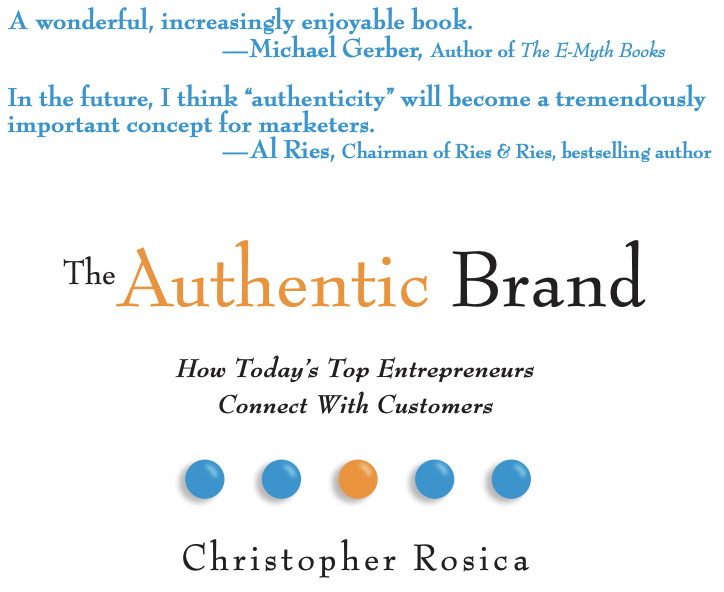This article is part of a series of writings we’ll be posting to our blog in the coming weeks that are excerpted from The Authentic Brand by Chris Rosica. It explores, in depth, how authenticity impacts awareness, credibility, reputation, and brand perception for B2B, B2C, and nonprofit organizations.
Storytelling remains an imperative in today’s PR and marketing mix. The competitive nature of the corporate and nonprofit sectors makes it so. Organizations of all types, therefore, must stand apart to be noticed. So, how can an organization differentiate itself when such a large number of competing organizations are vying for our attention? One way is to put a “face” (or faces) on your organization. This means having your founder and/or top executive/s be visible spokespersons and ambassadors for your organization, connecting with customers or stakeholders wherever and whenever possible. Doing this gives the organization an identity that separates you from other, often faceless, competitors. Too many not-for-profits, schools, and companies forego authenticity for homogeneity – and they pay the price.
To solve the problem of facelessness, some organizations have opted for using celebrity endorsers, such as professional athletes or other VIPs, to promote their products. Does this make you feel that they are truly authentic? Studies have shown, in fact, that celebrity endorsements lack the level of credibility that is given to a product or organization when the person responsible for the product puts his or her identity on the line to promote it.
Based on a study by The Public Relations Society of America (PRSA), business leaders, experts in a given field, and educators rank the most credible, while celebrities and professional athletes actually rank towards the bottom of the list. Many of the entrepreneurs who have built successful brands are the ones who (visibly) represent their organizations. Through this personal connection, they have cultivated and secured true loyal advocates.
According to Jerry Greenfield and Ben Cohen, the founders of Ben & Jerry’s Homemade, “There is a tradition among homemade ice cream parlors that they’re named after the people who operate them. There was Steve’s Ice Cream; there was Bob’s Ice Cream, and others. When we were starting out as a homemade ice cream parlor, it was just a natural thing. It soon became clear that there are a lot of advantages to having it be named after real people, as opposed to fake people. As they say in marketing, it lends an air of authenticity.”
The combination of quality, caring, accountability, and human touch constitutes what we classify as an Authentic Brand. Jerry Baldwin, one of the original founders of Starbucks and later, a principal of Peet’s Coffee and Tea, tells the story of how he and his colleagues chose the Starbucks corporate name as they prepared to open their first location in 1971. “We concluded that it should be somebody’s surname,” he recalls. “Our names together—Baldwin, Bowker, and Siegel— sounded like a law firm, and none of the names individually was particularly good, so we picked a great name with Starbucks. We had a good logo, and we had a good name.”
David Neeleman, the founder and CEO of JetBlue Airways, says a brand name is less important than the integrity behind the name. According to Neeleman, “Ultimately it’s how you treat your customers. We could have named the airline anything we wanted to name it, but people will look up to it because of the way we serve every single customer.” From the start, Neeleman’s genuine commitment to his customers and to creating a positive and unique experience for people who fly JetBlue is unwavering.
Having an authentic story can form a strong connection between a consumer and a product or service. This method of connectivity creates messages that are remembered, and brand recall translates as brand loyalty. Today, many successful brands and organizations utilize this strategy, which includes telling an interesting, memorable, and authentic story. Consumers and customers react positively to stories of real people who stand behind their brands. An excellent example of a businessperson who became his own spokesman and who developed an extraordinarily positive relationship with consumers was Dave Thomas. The founder and chief executive officer of Wendy’s Old Fashioned Hamburgers, he is known for having appeared personally in more than 600 commercials for his restaurant chain, more than any other person in television history. Thomas was also revered for his commitment to raising awareness of and advancing adoptions. He was himself an orphan and told that story humbly and authentically when he served as spokesperson for a national adoption awareness campaign and subsequently established the David Thomas Foundation for Adoption.
Meanwhile, the use of well-known celebrities, such as sports figures, with no integral connection with the company or product often backfires, particularly when they endorse several products at the same time. Professional public speakers often use this manipulation technique as well, though often with fabricated, unauthentic stories.
There are many faceless companies that can be successful by utilizing the techniques of authenticity; telling a compelling story, and having the founders of the company or the principals of the organization be the face/s of that company. The Authentic Brand tells many of these stories and provides a good road map for putting a positive face on your company, organization, or brand.
Look for more excerpts from The Authentic Brand by Chris Rosica on our blog in the coming weeks.
Chris is president of Rosica Communications, an award-winning national PR, digital marketing, and integrated marketing communications agency that specializes in the nonprofit, education, and healthcare sectors.

